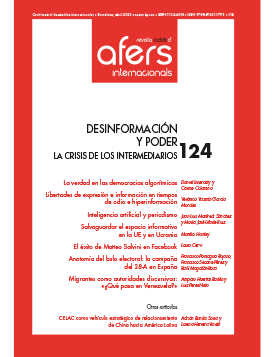La verdad en las democracias algorítmicas
Palabras clave:
desintermediación, desinformación, política, democracia, consenso, algoritmo, datos, aceleración digitalResumen
Revista CIDOB d’Afers Internacionals, nº 124
Cuatrimestral (enero-abril 2020)
ISSN:1133-6595 | E-ISSN:2013-035X
DOI: doi.org/10.24241/rcai.2020.124.1.11
La conversación pública se ha digitalizado. La red nos ofrece un espacio horizontal y descentralizado con una superabundancia de contenidos, mientras se ha acelerado un proceso de desintermediación que ha puesto fin al monopolio de los intérpretes tradicionales de la realidad. Los universos informativos y opinativos se mezclan, confunden e hibridan nuevos contenidos. La percepción de los hechos está mediada por las emociones y las verdades son de libre elección. Esta transformación no se explica solo por la crisis de los sistemas mediáticos tradicionales, sino también por el nuevo orden algorítmico que controla en gran medida la predeterminación selectiva de la información. ¿Cómo afecta al sistema democrático que el debate público tenga lugar en espacios tecnológicos de propiedad privada? ¿Quién controla este espacio digitalizado? El verdadero desafío existencial que supone para la democracia la creación de nuevos sistemas de poder y nuevas desigualdades sociales se dirimirá en la dataficación y la gobernanza algorítmica.
Citas
Arendt, Hannah. Between past and future. Eight exercises in political thought. Nueva York: Penguin Books, 2006[1961].
Arias Maldonado, Manuel. «Informe sobre los ciegos. Genealogía de la posverdad». En: Ibañez, Jordi (ed). La era de la posverdad. Barcelona: Calambur, 2017, p. 65-77.
Baricco, Alessandro. The game. Barcelona: Anagrama, 2019.
Bayer, Judit; Bitiukova, Natalija; Bard, Petra; Szakács, Judit; Alemanno, Alberto y Uszkiewicz, Erik. «Disinformation and Propaganda – Impact on the Functioning of the Rule of Law in the EU and its Member States». HEC Paris Research Paper, n.º LAW-2019-1341 (2019) (en línea) https://dx.doi.org/10.2139/ssrn.3409279
Calvo, Patrici. «Democracia algorítmica: consideraciones éticas sobre la dataficación de la esfera pública». Revista del CLAD Reforma y Democracia, n.º 74 (2019), p. 5-30.
Cassam, Quassim. Vices of the mind. From the intellectual to the political. Oxford: Oxford University Press, 2019.
Flynn, DJ; Nyhan, Brendan y Reifler, Jason. «The Nature and origins of Misperceptions: Understanding false and unsupported beliefs about politics». Advances in Political Psychology, vol. 38, n.º S1 (2017), p. 127-150.
Frankfurt, Harry G. On Bullshit. Princeton: Princeton University Press, 2005.
Harari, Noah Yuval. 21 lecciones para el siglo xxi. Barcelona: Debate, 2018.
Innerarity, Daniel. Una teoría de la democracia compleja. Gobernar en el siglo xxi. Barcelona: Galaxia Gutenberg, 2020.
Kakutani, Michiko. La muerte de la verdad. Notas sobre la falsedad en la era Trump. Barcelona: Galaxia Gutenberg, 2019.
Kavanagh, Jennifer y Rich, Michael D. Truth Decay. An Initial Exploration of the Diminishing Role of Facts and Analysis in American Public Life. Santa Mónica, CA: Rand Corporation, 2018.
Manin, Bernard. The principles of representative government. Cambridge: Cambridge University Press, 1997.
Parlamento Europeo. «Resolución de 23 de noviembre de 2016, sobre la comunicación estratégica de la UE para contrarrestar la propaganda de terceros en su contra (2016/2030(INI)». Parlamento Europeo, (2016) (en línea) https://www.europarl.europa.eu/doceo/document/TA-8-2016-0441_ES.html
Rawls, John. Collected papers. Cambridge: Harvard University Press, 1999.
Revel, Jean François. Comment les democracies finisent. París: Grasset, 1983.
Rorty, Richard. The priortity of democracy to philosophy, en Objectivity relativism and truth: Philosophical papers. Cambridge: Cambridge University Press, 1991.
Scheidt, Mélanie. «The European Union versus External Disinformation Campaigns in the Midst of Information Warfare: Ready for the Battle?». College of Europe, EU Diplomacy Papers [working paper], (2019) (en línea) http://aei.pitt.edu/id/eprint/100447
Schmitt-Beck, Rüdiger. «Mass communication, personal communication and vote choice: The filter hypothesis of media influence in comparative perspective». British Journal of Political Science, vol. 33, n.º 2 (2003), p. 233-259.
Sloman, Steven A. y Fernbach, Philip. The knowledge illusion: Why we never think alone. Nueva York: Riverhead Books, 2017.
Thompson, Mark. Sin palabras. ¿Qué ha pasado con el lenguaje de la política? Barcelona: Debate, 2017.
Urbinati, Nadia. Democracy disfigured. Opinion, truth and the people. Cambridge: Harvard University Press, 2014.
Van Alstyne, Marshall y Brynjolfsson, Erik. Electronic Communities: Global Village or Cyberbalkans?». Proceedings of the International Conference on Information Systems, (1997) (en línea) http://citeseerx.ist.psu.edu/viewdoc/summary?doi=10.1.1.72.3676
Vosoughi, Soroush; Roy, Deb y Aral, Sinan. «The spread of true and false news online». Science, vol. 359, n.º 6.380 (2018), p. 1.146-1.151.
Waisbord, Silvio. «The elective affinity between post-truth communication and populist politics». Communication Research and Practice, vol. 4, n.º 1 (2018), p. 17-34.













